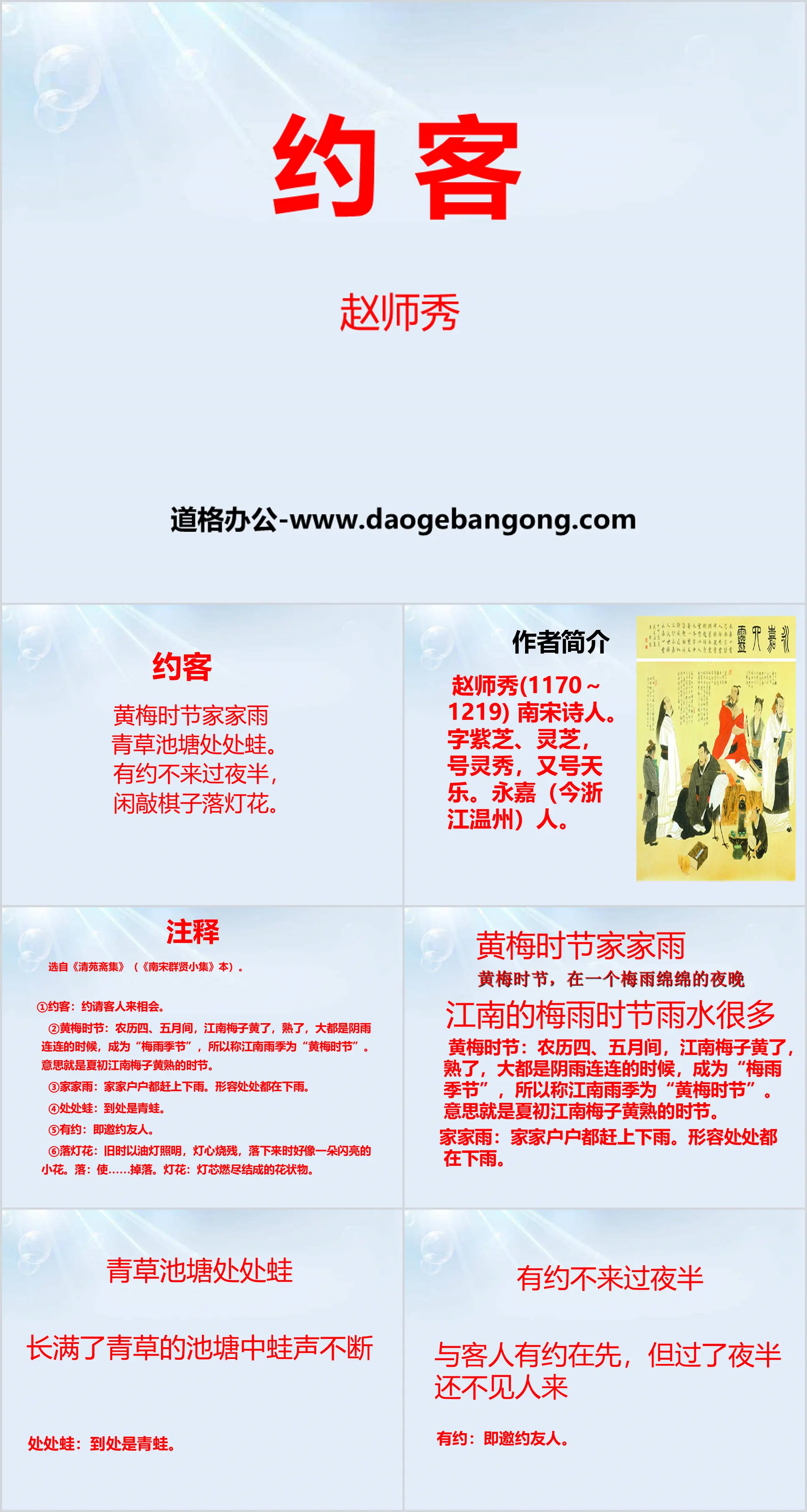"Yoke" PPT Simple campus recruitment activity planning plan summary enterprise and institution recruitment publicity lecture PPT template is a general PPT template for business post competition provided by the manuscript PPT, simple campus recruitment activity planning plan summary enterprise and institution recruitment promotion Lecture PPT template, you can edit and modify the text and pictures in the source file by downloading the source file. If you want more exquisite business PPT templates, you can come to grid resource. Doug resource PPT, massive PPT template slide material download, we only make high-quality PPT templates!
| 文件名 如何下载使用 | 下载次数 | Download Points | 下载地址 |
|---|---|---|---|
| "Yoke" PPT | 23225次 | 0.00 | Free Download |
Tips: If you open the template and feel that it is not suitable for all your needs, you can search for related content "Yoke" PPT is enough.
How to use the Windows system template
Directly decompress the file and use it with office or wps
How to use the Mac system template
Directly decompress the file and use it Office or wps can be used
Related reading
For more detailed PPT-related tutorials and font tutorials, you can view: Click to see
How to create a high-quality technological sense PPT? 4 ways to share the bottom of the box
Notice
Do not download in WeChat, Zhihu, QQ, built-in browsers, please use mobile browsers to download! If you are a mobile phone user, please download it on your computer!
1. The manuscript PPT is only for study and reference, please delete it 24 hours after downloading.
2. If the resource involves your legitimate rights and interests, delete it immediately.
3. Contact information: service@daogebangong.com
"Yoke" PPT, due to usage restrictions, it is only for personal study and reference use. For commercial use, please go to the relevant official website for authorization.
(Personal non-commercial use refers to the use of this font to complete the display of personal works, including but not limited to the design of personal papers, resumes, etc.)

Related reading
For more detailed PPT-related tutorials and font tutorials, you can view:Please click to see










Authoritative PPT Summary
"Yoke" PPT
Part 1: Introduction to the author
Zhao Shixiu (1170~1219) was a poet of the Southern Song Dynasty. The name is Zizhi, Lingzhi, Lingxiu, and Tianle. A native of Yongjia (now Wenzhou, Zhejiang).
Comment
Selected from "Qingyuan Zhai Ji" ("The Collection of Qun Xian of the Southern Song Dynasty").
① Make an appointment: Invite guests to meet.
②Huangmei Season: During April and May of the lunar calendar, the plums in the south of the Yangtze River turn yellow and ripe, mostly when it rains continuously, which is called the "plum rain season", so the rainy season in the south of the Yangtze River is called the "yellow plum season". It means the beginning of summer when the plums in the south of the Yangtze River are yellow and ripe.
③It rains in every house: It rains in every house. It means it is raining everywhere.
④Frogs everywhere: Frogs are everywhere.
⑤ Make an appointment: Invite friends.
⑥Falling lamp flower: In the old days, oil lamps were used for lighting. The wick of the lamp burned out, and when it fell down it looked like a shining little flower. Fall: to make... fall. Lantern flower: a flower-like object formed by burning out the wick of a lamp.
About the guest PPT, the second part of the content: poetry analysis
Rain in every house during Huangmei season
During the yellow plum season, on a rainy night
There is a lot of rain during the plum rain season in Jiangnan
Huangmei Season: During the fourth and fifth lunar months, the plums in Jiangnan become yellow and ripe, mostly when it rains continuously, which is called the "Meiyu Season", so the rainy season in Jiangnan is called the "Huangmei Season". It means the beginning of summer when the plums in the south of the Yangtze River are yellow and ripe.
It rains in every house: It rains in every house. It means it is raining everywhere.
Frogs everywhere in the grassy pond
Frogs chirp in the grassy pond
Frogs Everywhere: Frogs are everywhere.
I have an appointment but I can’t come until midnight
I had an appointment with a guest, but no one came after midnight
Make an appointment: Invite friends.
Knock the chess pieces and let the lights fall
When I was bored, I knocked on the chess pieces and knocked down the lanterns.
Falling lamp flower: In the old days, oil lamps were used for lighting, and the wick of the lamp burned out. When it fell, it looked like a shining little flower. Lantern flower: a flower-like object formed by burning out the wick of a lamp.
Fall: to make... fall.
About guest PPT, the third part: poetry appreciation
The first two sentences explain the environment and season at that time. "Huangmei", "rain", "pond" and "frog" describe the scene of summer nights in the plum rain season in the south of the Yangtze River: the sound of rain continues and the sound of frogs is heard. Reading it makes people feel as if they are actually there, as if the drizzle is floating around them and the sound of frogs is croaking around them. This seems to be a "lively" environment, but in fact the poet wants to reflect its "silence".
Through the rendering of the provocative environment and the detailed action of "knocking chess pieces leisurely", the whole poem not only describes the scene of the poet waiting for the guests to visit on a rainy night, but also writes about the feeling of melancholy when the guests have not arrived. Both. The whole poem has a strong flavor of life, and is free from the habit of carving. It is clear and beautiful and can be recited.
About the guest PPT, the fourth part: the theme idea
On nights during the yellow plum rain season, frogs croaking can be heard from the village pond. The poet invited a friend to be a guest, but he didn't come until midnight. He had no choice but to play the chess pieces boredly with an oil lamp alone.
The language is close and affectionate, implicitly expressing the author's lonely mood.
What season is this poem about and what things does it describe? What atmosphere does the scenery in the poem convey?
This poem describes a night in late spring and early summer in the south of the Yangtze River, including rain, ponds, and frogs. "Rain Every Family" not only depicts the omnipresence and rapid intensity of summer plum rain, expressing the freshness and tranquility of the rural scene, but also hints at the objective reasons why guests cannot keep their appointments as scheduled, revealing the poet's helplessness towards the rainy weather of continuous plum rain. "Frogs Everywhere" not only describes the sound of frogs in the pond, but also uses the sound to set off the silence, which highlights the quiet and harmonious atmosphere of the rural night during the rainy season. It also reflects the poet's loneliness and restlessness.
What is the most wonderful sentence in the poem? How does it describe the poet's mood?
I have an appointment but I can’t come until midnight
Knock the chess pieces and let the lights fall
The last two sentences highlight the characters and things. The host waited patiently and somewhat anxiously.
Keywords: Free download of the Chinese PPT courseware for the second volume of the fifth grade of the E-education edition, PPT download by appointment, .PPT format;
For more information about the "Yoke" PPT courseware, please click the "Yoke" ppt tab.
"Extracurricular Ancient Poetry Recitation" PPT download:
"Extracurricular Ancient Poetry Recitation" PPT Download Part One: Scene Introduction Students, ancient poetry is a pearl of the splendid culture of ancient my country. An ancient poem is a colorful painting and a sweet song. It is also an important part of Chinese language learning for junior high school students..
"Extracurricular Ancient Poetry Recitation" PPT courseware:
"Extracurricular Recitation of Ancient Poems" PPT Courseware Mooring in Qinhuai Du Mu A smoke cage with cold water and a moon cage in the sand. I moored in Qinhuai at night near a restaurant. The merchant girl does not know the hatred of the country's subjugation, but she still sings the flowers in the backyard across the river. About the author Du Mu (803852), also known as Muzhi and Fanchuan layman. A litterateur of the Tang Dynasty, the capital has been known for thousands of years..